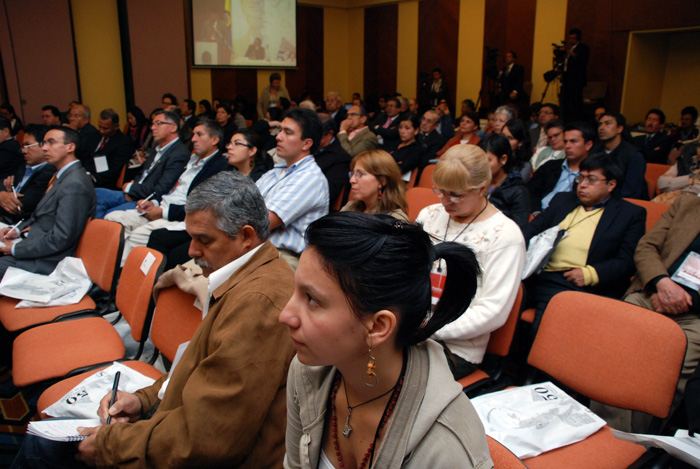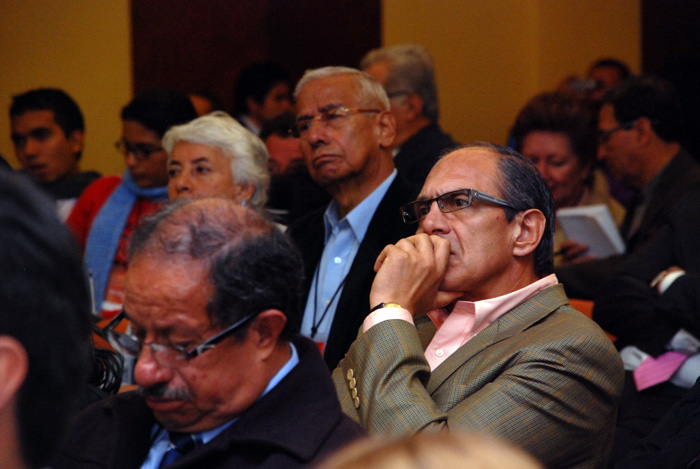Tomás Barrero, Professor at the Universidad de los Andes, depicted the personality of Alfonso López Pumarejo; he insisted on his diplomatic role and as the artificer of the Rio Protocol.
Francisco Colom, scientific researcher and PhD in Philosophy, presented an introduction on the meaning of the concept of nation. "Nations don"t exist without their citizens. The education policy during López Pumarejo"s Presidency generated several disagreements," said Colom.
The researcher stated that the political and national projects on public education keep evolving, "López Pumarejo"s policy was oriented to build the nation, to create universities with competitive careers, by engaging public and private founds.
Jesus Rodríguez Zepeda, researcher and professor at the Universidad Autónoma Metropolitana de México, was thankful for this invitation to speak on the educational revolution. Ródriguez talked about the government of Alfonso López Pumarejo in the context of the revolution in Latin America.
He insisted that we have to ask ourselves about the lessons of the Revolution in Motion in Latin America. Rodríguez Zepeda said that it was important to deal with present and future as the first point of the shared agenda. "Is very hard to take up again a direct influence, such as the one from President Roosevelt or Lopez Pumarejo"s revolution, but is possible to find a similar model."
He added that Alfonso López "is the proof that, at least, State"s social activism has to be shared. When we evaluate the contributions to the construction of a modern State, which includes economical, social and cultural aspects, the list of reforms he accomplished is enormous."
"In the case of the reformism, is essential to understand his policies as a constant to modify the State"s structure. He shared this way of strengthening the State, with several countries in Latin America," asserted Rodríquez, who pointed out that the institutions of a strong State are only the result of power. By definition, there can"t be a strong state without a deliberate process."
Alfonso López is remembered for the modernization of the State, said Zepeda. We can see this influence today with the essential activity accomplished by the Universidad Nacional de Colombia to contribute to strengthen and consolidate the independence of national universities.
When he referred to the term "revolution", he pointed out that it corresponds to a violent change, but also, to a fast and profound change: this is the case of Alfonso López Pumarejo, who also "is responsible for the political meaning of revolution, of the deep social change prompted by the violence."
He declared that the French Revolution in 1789 was the beginning and the model for future revolutions. "The French revolution accredited the following revolutions; they promised us a better future of social order. The figure of López Pumarejo, a reformist, not a revolutionary, is the only serious path of transformation," he explained.
Professor Darío Acevedo concluded that López Pumarejo participated in fundamental processes in the history of Colombia. During the first three decades of the XXth century, there was a transformation of the liberal doctrine that defended collective rights.
He admitted that López Pumarejo outshined Enrique Olaya Herrera, because the late governed with a liberal congress, which allowed him to go further in the secularization of the State.
"Alfonso López was a great personality, a visionary, a man of his time rather than a providential figure," said Acevedo. He declared that López was a pioneer during troublesome times; he wanted to go farther but didn"t have enough support. In addition he had to bear with the Catholic Church antagonism."
 Correo Electrónico
Correo Electrónico
 DNINFOA - SIA
DNINFOA - SIA
 Bibliotecas
Bibliotecas
 Convocatorias
Convocatorias
 Identidad UNAL
Identidad UNAL





